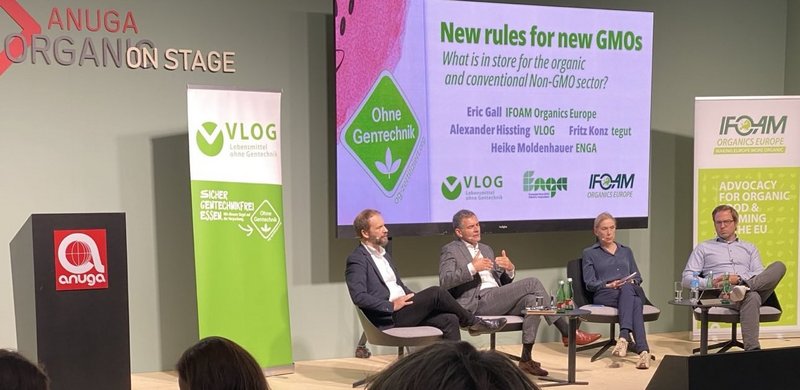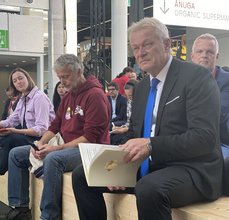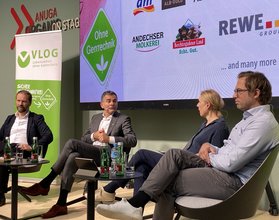Press
Appeal to the Minister of Agriculture: The industry needs strong GMO regulations!
During the 90-minute panel discussion "New rules for new GMOs: What is in store for the organic and conventional Non-GMO sector?" on the opening day of the fair, Eric Gall from the European organic umbrella organisation IFOAM Organics Europe, Fritz Konz from the retailer Tegut and Alexander Hissting from the Association Food without Genetic Engineering (VLOG) discussed the upcoming challenges that the planned EU deregulation of NGT will pose, especially for organic and "Ohne Gentechnik" (Non-GMO) products. Heike Moldenhauer from the European Non-GMO Industry Association (ENGA) chaired the panel discussion.
Transparency must be maintained
All participants agreed that transparency for consumers must be maintained. However, this is only possible if all types of genetic engineering, including NGT, remain recognisable on the shelves as before. They also addressed this message directly to the German Minister of Agriculture, Alois Rainer, who later spoke on the Anuga Organic Stage. When asked on the sidelines of his appearance, Rainer said it was highly questionable whether there would be a future genetic engineering labelling requirement for NGT in end products.
Comprehensive genetic engineering labelling must not be "questionable"
"Comprehensive genetic engineering labelling must not be ‘questionable‘; it is absolutely essential for consumers and the industry! This is the minimum that Mr Rainer must advocate for in Brussels. According to a survey, four out of five Germans expressly demand this from him personally," said Alexander Hissting.
This is about much more than transparency
"For me, this is about much more than just transparency. It is also about the values of our society, which should not be negotiable. It is about freedom of choice. Remain with it and make that clear," Fritz Konz appealed to the minister.
Preserving the strength of the European food industry
Eric Gall called for the preservation of the European food production system, which differs from that of the USA, for example: "We have a diverse food system here. The added value of European food lies primarily in its quality, image and reputation. This includes the fact that European consumers and producers firmly reject genetic engineering. This strength of the European food industry must be preserved, with transparency – and also with a clear commitment from politicians to protect farmers, breeders and the food industry from the private appropriation of genetic resources through patents."
Finally, the panellists used examples to demonstrate how businesses can exert influence to draw the attention of political decision-makers in Berlin and Brussels to the great economic importance of a functioning GMO-free food industry – and to what is urgently needed to preserve it.
The new regulation for genetically modified food in the EU is now in its critical phase. The next trilogue consultations between the European Parliament, the European Commission and the Council of Ministers are scheduled for mid-October in Brussels.
Raising awareness among a broad specialist audience at Anuga
"We are delighted that we can raise awareness of this highly topical political issue among a broad specialist audience from all areas of the food industry at Anuga. After all, the entire industry will be affected by the consequences of NGT deregulation, but not everyone is aware of this yet," concluded Heike Moldenhauer.




